This is adapted from a reflection given during Evening Prayer on March 17, at St. Margaret's Church in Middle Village, Queens.
 We all remember where we were on September 11, 2001. One of my most haunting memories, though, is the morning after.
We all remember where we were on September 11, 2001. One of my most haunting memories, though, is the morning after.
It was impossible to get out of Manhattan—or get in. Subways and trains had stopped. There were no cabs. I had to work late for CBS, and ended up walking several blocks through a deserted midtown to spend the night in a hotel on 52nd Street. I remember crossing Broadway and looking down toward Times Square and it was empty and dark. Completely deserted—except for the cops on every corner. It was nearly two in the morning before my head hit the pillow. I awoke five hours later to the sound of sirens.
I looked out the window. You probably remember: it was another stunning September day, just like the one before. I could see the street below. Fire engines and ambulances were heading downtown. I showered, threw on my clothes, and headed downstairs.
As I passed through the lobby to check out, I saw a strange figure checking in: a fireman. He was still wearing his coat and boots. But they were barely visible.
Because he was covered, head to foot, in ash.
He looked like a ghost. As he signed in, some of the ash flaked to the floor.
I've never been able to think of ashes, or Ash Wednesday, the same way. I've never quite looked at Lent the same way. It was the most powerful reminder of what ashes really mean to us—and why this season of sacrifice matters.
We began this season with ash—a reminder of our own limitations, and of loss. There is our loss of paradise, and our desire to lose part of ourselves for God. The part that's hard, or selfish, or petty. We want to burn it off, and bear the remnant, to show the world our desire to change.
But perhaps there is more to it than we realize.
More than ever before, it seems, we live in an age of ashes. Think of the fires that have lit our world, the embers left behind from so many wars, and so many ruins. Think of the fires of Hiroshima, of Auschwitz, of Vietnam, of Baghdad, of New York.
The fires that still smolder in Japan.
We are citizens of a world on fire.
And yet, we know hope. We believe in beginning again. We repent. We reconcile ourselves with God. We pray. We believe in something better to come: redemption and resurrection. We turn over shovels of ash to start anew.
And every now and then, we witness that miracle of renewal. The cities that burned, rebuild. A glass tower is growing at Ground Zero. Japan dreams of a new country rising from the ruins.
But first there is work to do.
And so, we have Lent.
A lot of people last week were asking, "What are you giving up?" Good question. But I like to remind myself that the first word of "giving up" is giving. It is not truly a sacrifice unless it is also, somehow, a gift. An offering of self, with no expectation of getting anything in return.
As the prophet Joel cried out: "Rend your hearts." Open them up for the world. Give something beyond measure, from what you carry within. That is where penance begins.
Penance means more than just prayer and fasting, devotions and dieting. It is also a hardship (it shares the same root as the word "penalty" and "penitentiary").
What are some of the modern hardships we find difficult to bear?
Well, try this: spend a few moments respectfully listening to someone you can't stand, or somebody that no one else likes, either. I once heard of a monk who got into some sort of trouble at a monastery. At meals, no one would sit with him, except for one other monk, who went out of his way to spend just a few minutes quietly eating with him, and letting him know that he still mattered.
That lone monk was being Christ to another.
Or if that seems like too much, try this: Fold a twenty-dollar bill and slip it into the poor box. Pray for a stranger, or even an enemy. Skip dessert and send the money to a bread line. Take time to write a letter to a soldier overseas. Visit the sick, the aging, the shut-in. Light a candle for all those who are lost, frightened, uncertain, or alone. Buy a bagel for the homeless woman you see at the train station every morning. Say a rosary for peace.
Mark this season of giving up . . . by giving.
Plant these small seeds of sacrifice. Tend them. Nurture them. And then let the roots take hold.
And, in time, grace will grow.
Two years ago, everyone was marking the 40th anniversary of Woodstock. The media were full of stories. Where are the flower children now? What has happened to them? Well, one of them worked at my office in Brooklyn, a grandmother who swept floors and emptied trashcans and had long hair she wore in a braid. She chatted with me one night about her memories of going to Woodstock as a young woman. She seemed happy to remember what was, and content with what is—where her life had taken her.





